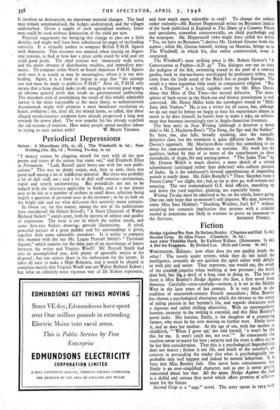Periodical Depressions
Orion : A Miscellany (II), 6s., ; The Windmill, 4s. 6d.; New Writing (No. 26), 9d ; Writing To-day, 3s. 6d.
" I REALLY cannot be plaguing myself for ever with all the new poems and states of the nation that come out," said Elizabeth Elliot in Persuasion. "Lady Russell quite bores one with her new publi- cations." This was no doubt unjust, and, then as now, there was good stuff among a lot of indifferent material. But there was probably a lot of dull stuff, too ; and a lot of dull stuff remains—pretentious, vapid and utterly uninteresting. But periodicals are not to be judged with the strictness applicable to books, and it is not always easy to be fair to a number of authors in small doses, selection being largely a question of personal taste in the reviewer ; so let us look on the bright side and see what delicacies this austerity menu contains.
In Orion (or, for that matter, among the rest of the publications here considered) Sir Osbert Sitwell's " A Short Character of Walter Richard Sickert " stands apart both by interest of subject and quality of expression. The form is one in which the author excels, and some first-rate Sickert drawings, provide illustrations. A vivid, powerful picture of a great palter and his surroundings is given, together with some admirable anecdotes. Is it unfair to compare this memoir with the late Mr. Logan Pearsall Smith's " Tavistock Square," which consists for the &tint part of an interchange of letters between the writer and Virginia Woolf? Mi. Pearsall Smith had also an accomplished pen, with plenty of agreeable malice at his disposal ; but one cannot ;hare in his enthusiasm for the letters. It takes all sorts to make a High -Bohemia, and it would be absurd to complain merely that Virginia Woolf was not Walter Richard Sickert ; but what an infinitely more vigorous way of life Sicken represents, and how much more enjoyable to read! To change the subject rather violently—Mr. Rayner Heppenstall writes on Bernanos (author of the book published in England as The Diary of a Country Priest) and speculates, somewhat controversially, on child psychology and the scapegoat. Mr. Heppenstall (who might have called his article " Yes, we have no Bernanos ") derives Mr. Grahani Greene from this author - while Mr. Greene himself, writing on Mauriac, brings us to The Windmill, in which his, also rather controversial, essay is contained.
The Windmill's most striking piece is Mr. Robert Graves's "A Conversation at Paphos—A.D. 43." This dialogue sets out to trace the pedigree of the fish, swimming round in the pool of a convent garden, back to thesea-beasts worshipped by prehistoric tribes, who came from the lands south of the Black Sea to people Europe. The result is a most ingeni6us little study in comparative religion. "Boy with a Trumpet " is a hard, capable story by Mr. Rhys Davies about that Hero of Our Time—the mental defective. The atmo- sphere of back-street in the black-out and blowsy prostitution is well conveyed. Mr. Henry Miller kicks the astrologers round in "Hello June 26th Yoohoo." He is not a writer for all tastes, but, although we do not read far before we begin to hate his experiences almost as much as he does himself, he knoWs how to make a joie, an achieve- ment that becomes increasingly rare in Anglo-American literature. The best story in New Writing (although it deserves a better title) is Mr. J. Maclaren-Ross's "The Swag, the Spy and the Soldier." Its hero, too, also falls, broadly speaking, into the mentally defective Class, but the treatment is quite different from Mr Rhys Davies's approach. Mr. Maclaren-Ross really has something to say about his near criminal bohemians in wartime. His work has the qualities, lacked by that of so many of the contributors .to these periodicals, of shape, life and staying-power. 'The Judas Tree " by Mr. Denton Welch is much shorter, a mere sketch of a retired schoolmaster (unhinged rather than deficient) who collects pictures of Judas. In it the adolescent's fevered apprehension of impending assault is neatly done. Mr. Giles Romilly's "Three Sketches from a Prison Camp " are slight, too ; but, as far as they go, well written and amusing. The two tremendously G.S. field officers, marching up and down the yard together, gloating, are especially funny. Writing To-day must be admitted to be, on the whole, heavy going. One can only hope that to-morrow's will improve. We may, however, enjoy Miss Inez Holden's "Shocking Weather, Isn't It? " without accepting her romantic implication that persons with a criminal record in peacetime are likely in wartime to prove an bmament to






























 Previous page
Previous page